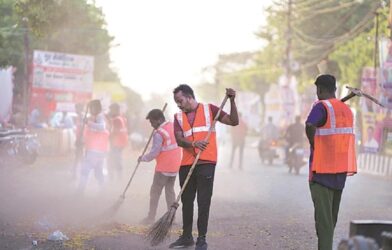Through its Swasthya Path initiative, ROADIS is bringing about revolutionary change in rural Varanasi, where access to high-quality healthcare has long been a problem. This Corporate Social Responsibility (CSR) initiative, which was started in October 2022 and expanded with the inclusion of a Mobile Medical Unit (MMU) on October 3, 2024, is providing vital healthcare services to underprivileged areas with assistance from The Hans Foundation.
The programme, which spans five blocks (Kashi Vidyapeeth, Araziline, Baragaon, Chiraigaon, and Pindra) and encompasses 110 villages, 63,646 homes, and roughly 444,000 individuals, focuses on awareness, diagnosis, treatment, and referrals. With a focus on creative menstrual health initiatives, ROADIS’ MMUs are revolutionising healthcare delivery in rural India by removing financial obstacles and building community trust.
These Mobile Medical Units provide healthcare services directly to communities as part of ROADIS’ CSR outreach, removing the need for time-consuming and expensive travel to urban areas. Qualified MBBS physicians, nurses, lab technicians, chemists and drivers staff each facility, offering free consultations, diagnostic testing, medications and referrals. With the help of Hans Swasthya Sakhis and 108 community volunteers, the initiative uses digital tools like CommCare to track patient data effectively.
The MMUs demonstrated ROADIS’ dedication to effective healthcare delivery by treating 139,814 patients, performing 45,692 lab tests, making 798 home visits, and facilitating 1,338 referrals between October 2022 and December 2024. ROADIS carries out comprehensive health education programmes with assistance from The Hans Foundation, which serves as the implementation partner. During Phase I, 2,030 community meetings with 129,238 participants and 452 awareness sessions with 13,476 participants covered themes such as maternal health, non-communicable diseases (NCDs), and hygiene. 63 campaigns, such as Dengue Day on 15 June, which used street plays to raise awareness of vector-borne diseases, reached 1,765 people in Q1 2025. These initiatives equip communities with the knowledge they need to avoid diseases and seek care when they need it.
The MMUs provide on-site diagnostics; in Phase I, they performed 45,692 lab tests to detect diseases like dengue, diabetes, hypertension, and malaria. Outpatient appointments lasted 5–6 minutes on average in Q1 2025, during which time camps screened for serious health conditions. Personalised follow-ups and the avoidance of difficulties are made possible by digital solutions that guarantee reliable record-keeping, especially for families living below the poverty line (BPL).
139,814 patients were treated by the MMUs in Phase I and 17,338 in Q1 2025. Following thorough audits to reduce waste, the MMUs provided free medications. The programme offers specialised camps for orthopaedic, dental, skin, and gynaecological care, and it treats a broad spectrum of disorders, from minor illnesses to chronic diseases. High patient satisfaction and better health results are guaranteed by this all-encompassing strategy.















Comments are closed